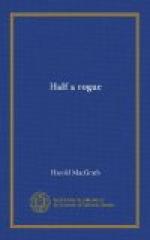Warrington stopped his horse. He had no desire to ride closer; he could see everything well enough from where he sat. Rosy apples twinkled in the orchard on the hill, and golden pumpkins glistened afield, for by now Phoebus had come to his own. How many dawns had he seen from yonder windows, in summer and winter, in autumn and spring? How many times had he gone dreaming to the markets over this road? It was beyond counting. Had any of those particular dreams come true? Not that he could recollect, for he had never dreamed of being a successful dramatist; that good fortune had been thrust upon him. He tried to picture his father walking toward the fields; it was too remote. His mother? Of her he could recollect positively nothing. But the aunt, he saw her everywhere,—in the garden, in the doorway, in the window, by the old well. Now she was culling hollyhocks along the stone wall, now she was coming down the hill with an apron filled with apples, now she was canning preserves and chili sauce in the hot kitchen, or the steel-rimmed spectacles were shining over the worn pages of the New Testament at night.
What was the use? To-day is alien to yesterday; an hour separates as definitely as eternity. There was nothing there for him; so he wheeled and rode back toward the city, conning over a speech he was to make that night. Since Patty had not ridden this way, the zest of the morning’s ride was gone. Which road did she take now? To the west, to the south, to the north round the lake? Twice the night before he had started for the telephone to inquire, but had not taken down the receiver. Was he afraid? He could not say. And afraid of what? Still less could he tell. Three months ago he had called her Patty, had jested and laughed with her; and now he hesitated to call her up by telephone. No, he was not afraid of Patty; he was simply afraid of himself. For he realized this—that in the moment he spoke to her alone his love would spring from his lips like a torrent; nothing could stop it; and he was not of that supreme courage at present that spurs the lover to put it to the touch to win or lose it all.
So, then, he rode back to the city, hugging his doubt and his love, with frequent lucid intervals that were devoted to his forthcoming speech. When the battle was over, when he had won or lost, then he would go to her and drink the cup, bitter or sweet.
Patty had not spent the night in comfort; her head had rolled from one pillow to another, and the cases were not always dry. Indeed, it had been some time since she had pressed her cheek tranquilly upon a pillow. Night is either sweetest or most wretched; one spends it recounting one’s joys or one’s sorrows. Patty was unhappy; and leave it to youth to gain the full meed of misery. Youth has not the philosophy of matured age to cast into the balance. Satisfaction in this workaday world is only momentary. One is never wholly satisfied; there is always some hidden barb. The child wears the mother’s skirts enviously while the mother mourns her youth. Expectation leads us to the dividing line of life, and from there retrospection carries us to the end. Experience teaches us that fire burns and that water quenches; beyond this we have learned but little.




